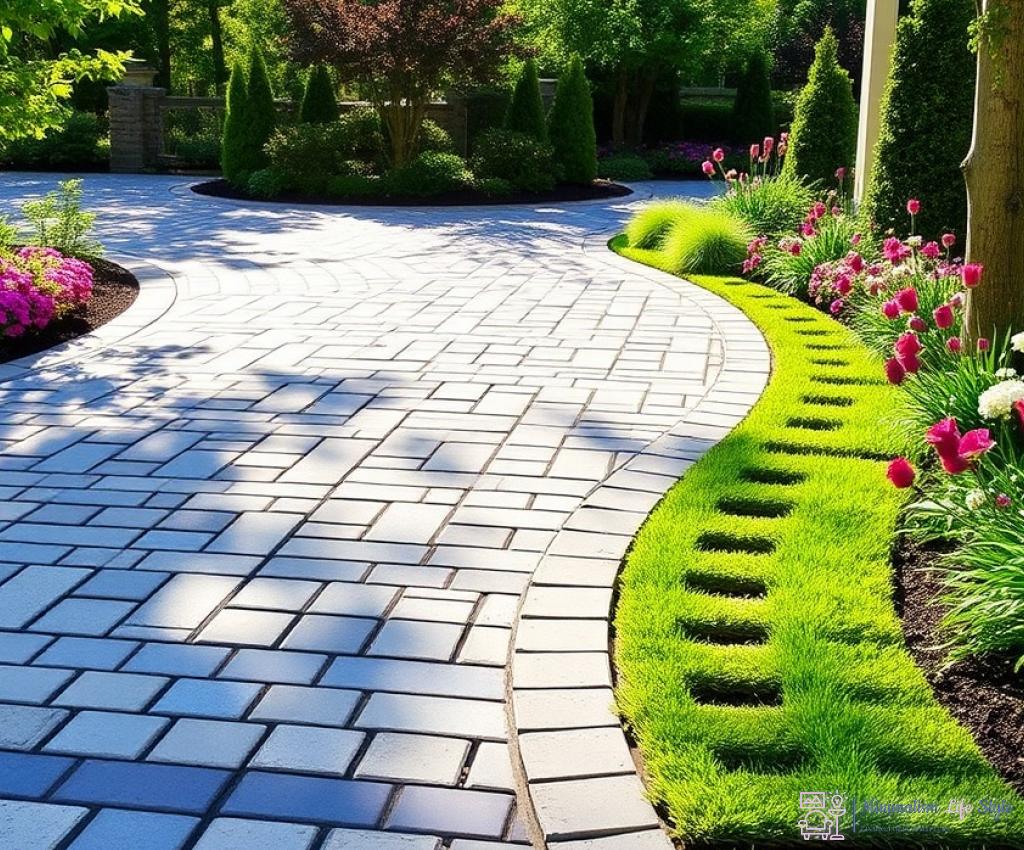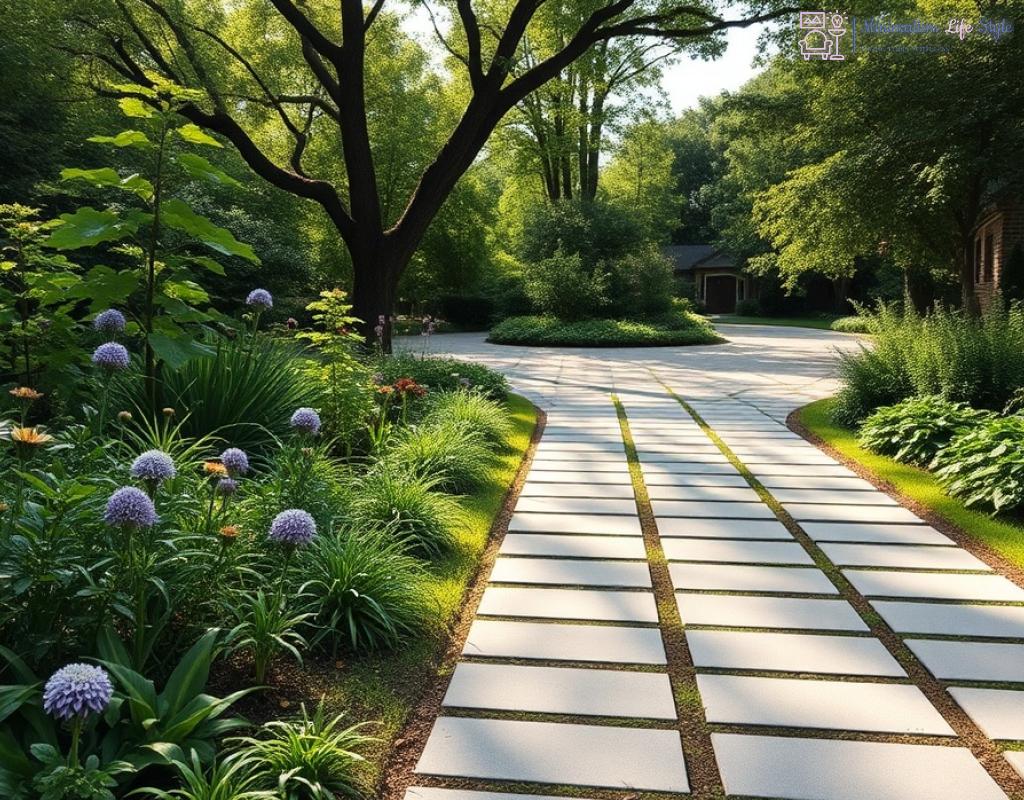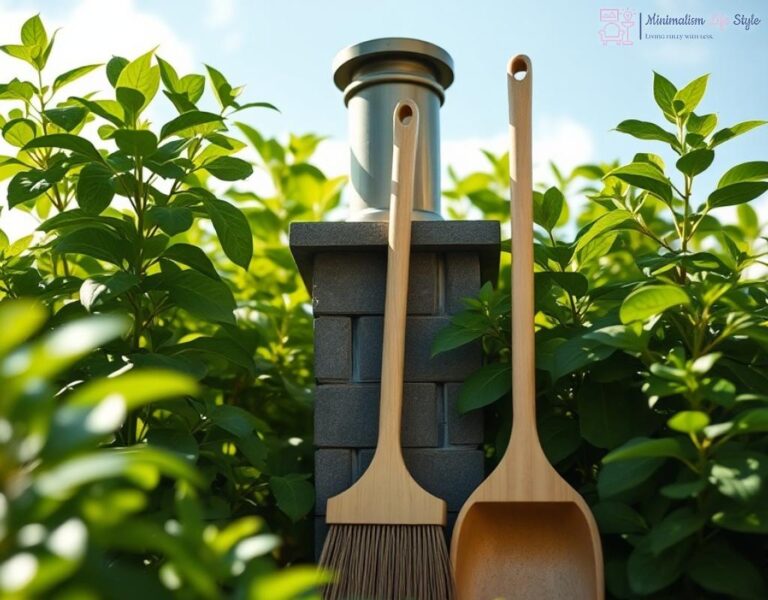Understanding Permeable Paving Options

Exploring the Benefits of Permeable Paving
In today’s eco-conscious world, homeowners are increasingly seeking sustainable solutions that not only enhance the aesthetic appeal of their properties but also contribute positively to the environment. Permeable paving is one of these innovative options that allow water to seep through the surface, reducing runoff and promoting groundwater recharge. Let’s delve into the various permeable paving solutions available, their benefits, and how they can transform your driveway into a sustainable asset.
A Closer Look at Different Types of Permeable Paving
When it comes to choosing permeable paving, there are several popular options that cater to different preferences and requirements. Each type has unique characteristics that can suit various landscapes and usage scenarios. Below is a comparative list of some of the most common permeable paving solutions:
- Permeable Concrete: A special type of concrete that contains larger aggregates and less sand, allowing water to flow through.
- Permeable Asphalt: Similar to traditional asphalt, but designed with voids to permit water infiltration.
- Interlocking Pavers: Concrete or brick units that form a pattern, with spaces between them filled with gravel or grass.
- Grass Pavers: Designed to support vehicle weight while allowing grass to grow through, creating a natural look.
Making the Right Choice for Your Driveway
Choosing the right permeable paving option for your driveway depends on several factors including climate, location, and intended use. It’s important to assess the specific conditions of your property and consult with experts if needed to ensure you select a solution that aligns with your sustainability goals. Remember, not only are you investing in a practical solution for water management, but you are also enhancing the ecological balance of your surroundings.
Benefits of Eco-Friendly Driveway Solutions
In an era where environmental considerations are at the forefront of home improvement discussions, transitioning to eco-friendly driveway solutions is not just a trend; it’s a necessity. Homeowners are increasingly aware of the impact their choices have on the planet, and eco-friendly driveway solutions provide a means to combine functionality with sustainability. By opting for permeable paving, individuals can experience a multitude of benefits that go beyond mere aesthetics.
One of the most significant advantages of permeable driveway options is their ability to reduce stormwater runoff. Traditional driveways often contribute to flooding and erosion by channeling rainwater directly into storm drains. In contrast, permeable surfaces allow water to seep through, promoting natural filtration and replenishing groundwater aquifers. This process not only helps protect local ecosystems but also minimizes the risk of surface water pollution.
Environmental Impact and Aesthetic Appeal
Integrating permeable paving into your driveway design also enhances the overall aesthetic appeal of your property. With an array of materials available—from interlocking pavers to porous concrete—homeowners can create unique and charming driveways that reflect their personal style. Permeable options can seamlessly blend with the landscape, adding a touch of sophistication while adhering to eco-friendly principles.
Moreover, these solutions contribute to temperature regulation in urban areas. Traditional asphalt and concrete absorb heat, leading to the urban heat island effect, where surrounding areas become significantly warmer. In contrast, permeable materials promote cooling through evaporation, fostering a more comfortable environment for both residents and wildlife.
Cost-Effectiveness and Longevity
While the initial investment in permeable paving may seem higher than conventional options, the long-term benefits are undeniable. By reducing the need for extensive drainage systems and minimizing erosion, homeowners can save significantly on maintenance and repair costs. Furthermore, permeable surfaces often have a longer lifespan when properly maintained, ensuring that your investment pays off over time.
Finally, eco-conscious driveway solutions foster a sense of community responsibility. By making sustainable choices, homeowners contribute to a collective effort to combat environmental challenges. This appeal to community values not only enhances individual properties but also promotes a greener neighborhood.
Maintenance Tips for Permeable Driveways
Maintaining a permeable driveway is crucial not only for its longevity but also for ensuring its ecological benefits continue to flourish. Unlike traditional driveways that may require extensive upkeep, permeable surfaces offer a unique balance of aesthetics and functionality with a minimalistic maintenance approach. By following a few simple care tips, you can safeguard your sustainable investment while enjoying the beauty of your driveway.
Regular Cleaning is Key – One of the most effective ways to ensure the functionality of your permeable driveway is through regular cleaning. This involves removing debris, leaves, and dirt that might accumulate over time. A simple broom or a leaf blower can do wonders. It’s important to address these issues promptly, as excessive buildup can obstruct water flow and diminish the permeable surface’s effectiveness. As you keep your driveway clean, you not only enhance its appearance but also promote the natural filtration processes that permeable paving is designed for.
Watch Out for Weeds – While permeable driveways allow for natural vegetation to thrive, they can also become home to unwanted weeds. Regularly inspecting your driveway for weed growth is essential. If you notice any unwanted plants, consider pulling them out by hand or using eco-friendly herbicides to keep your driveway looking pristine. This will help maintain a clean and tidy appearance while minimizing any adverse effects on the permeable material.
Seasonal Maintenance Practices – As seasons change, so do the maintenance requirements for your driveway. In colder climates, ensuring that snow and ice are promptly removed is vital to avoid water pooling and potential freezing. Using a plastic shovel is recommended to prevent damage to the surface. During the fall, more attention should be given to leaf removal, as decomposing leaves can create a thick layer that hinders water infiltration. Additionally, consider replenishing the gravel or grass in interlocking pavers as needed to maintain a balanced aesthetic and ensure proper drainage.
Periodic Inspections – Conducting periodic inspections of your permeable driveway is crucial in identifying any potential issues before they escalate. Look for signs of sediment buildup or cracks that may disrupt water flow. If you find any, address them promptly—whether by cleaning the surface or consulting a professional for repairs. This proactive approach not only prolongs the life of your driveway but also preserves its ecological advantages.
By adopting these straightforward maintenance practices, homeowners can enjoy the benefits of a permeable driveway without excessive effort. The eco-conscious choice of permeable paving is not just about installation; it’s about nurturing a sustainable environment that enhances both your property and the community.
Cost-Effective Eco-Conscious Driveway Designs
Innovative Designs for a Sustainable Future
As the shift toward sustainable living gains momentum, homeowners are discovering that eco-conscious driveway designs not only serve practical purposes but also enhance the overall aesthetic of their properties. By embracing permeable solutions, individuals can significantly reduce their carbon footprint while enjoying a visually appealing landscape. The intelligent integration of natural elements with modern design principles creates a harmonious balance that resonates with the minimalist ethos. This approach not only prioritizes sustainability but also champions cost-effectiveness, making it an appealing option for the environmentally aware homeowner.
Long-Term Savings through Smart Investment
Investing in eco-conscious driveway designs, particularly permeable paving, can lead to substantial savings over time. While the initial costs may appear higher compared to traditional options, the benefits far outweigh the upfront investment. For instance, permeable driveways mitigate the need for expensive drainage systems, as they allow rainwater to naturally infiltrate the ground. This leads to reduced stormwater management costs and lowers the risk of flooding or erosion that can damage your property.
Moreover, permeable surfaces often require less maintenance than their conventional counterparts. Homeowners can save on resources and labor by avoiding frequent repairs and replacements, which are common with standard asphalt or concrete driveways. Additionally, the longevity of permeable materials means that your investment yields returns for years to come, making it a financially savvy choice.
Transformative Aesthetics and Environmental Benefits
Another key advantage of choosing permeable driveway designs is their ability to enhance the visual appeal of your property while supporting environmental health. By selecting materials such as interlocking pavers or permeable concrete, homeowners can create stunning patterns and textures that elevate their outdoor space. These designs can seamlessly blend with the surrounding landscape, providing a natural look that complements gardens and lawns.
Furthermore, the ecological benefits are substantial. Permeable driveways play a vital role in replenishing groundwater supplies and reducing pollution runoff. They also help regulate temperature fluctuations, contributing to a more comfortable environment for both residents and local wildlife. By opting for eco-conscious designs, homeowners not only invest in their property but also contribute to a larger movement toward environmental stewardship.
Choosing the Right Materials for Sustainability
In the quest for a more sustainable living environment, the choice of materials for your driveway can significantly influence both ecological and aesthetic outcomes. Opting for permeable solutions not only facilitates effective water management but also aligns with a minimalist ethos that emphasizes efficiency and simplicity. As homeowners increasingly recognize the importance of sustainable practices, understanding the nuances of material selection becomes essential for achieving a balance between functionality and environmental responsibility.
Exploring Permeable Options for Durability and Elegance
When delving into permeable materials, it’s vital to consider factors such as durability, maintenance requirements, and visual appeal. Permeable concrete and asphalt are prime candidates, designed specifically to allow water infiltration while maintaining strength and stability. Notably, permeable concrete incorporates larger aggregate sizes, creating voids that facilitate drainage. In contrast, permeable asphalt utilizes a blend of materials that allows for similar performance while offering a smooth finish. These materials not only provide the necessary structural integrity for vehicles but also contribute to effective stormwater management.
The Role of Recycled Materials in Sustainable Choices
In addition to traditional options, the incorporation of recycled materials can enhance the sustainability of your driveway. Recycled aggregates and reclaimed pavers present a compelling choice, reducing the demand for new resources while promoting circular economy principles. By choosing recycled materials, homeowners can further minimize their ecological footprint and support the reduction of landfill waste. Moreover, these materials often exhibit unique textures and colors, adding an artistic flair to the driveway that aligns with minimalist design principles.
Visual Harmony and Environmental Benefits
Ultimately, the materials selected for your permeable driveway should reflect not only your personal style but also your commitment to sustainability. Creating a visually harmonious outdoor space can be achieved through thoughtful combinations of textures, colors, and patterns. For instance, interlocking pavers can be arranged in intricate designs, allowing for the integration of greenery and natural elements that enhance biodiversity. The ecological benefits of permeable solutions extend beyond their immediate function; they serve as a catalyst for improving local ecosystems and promoting healthier urban environments.




